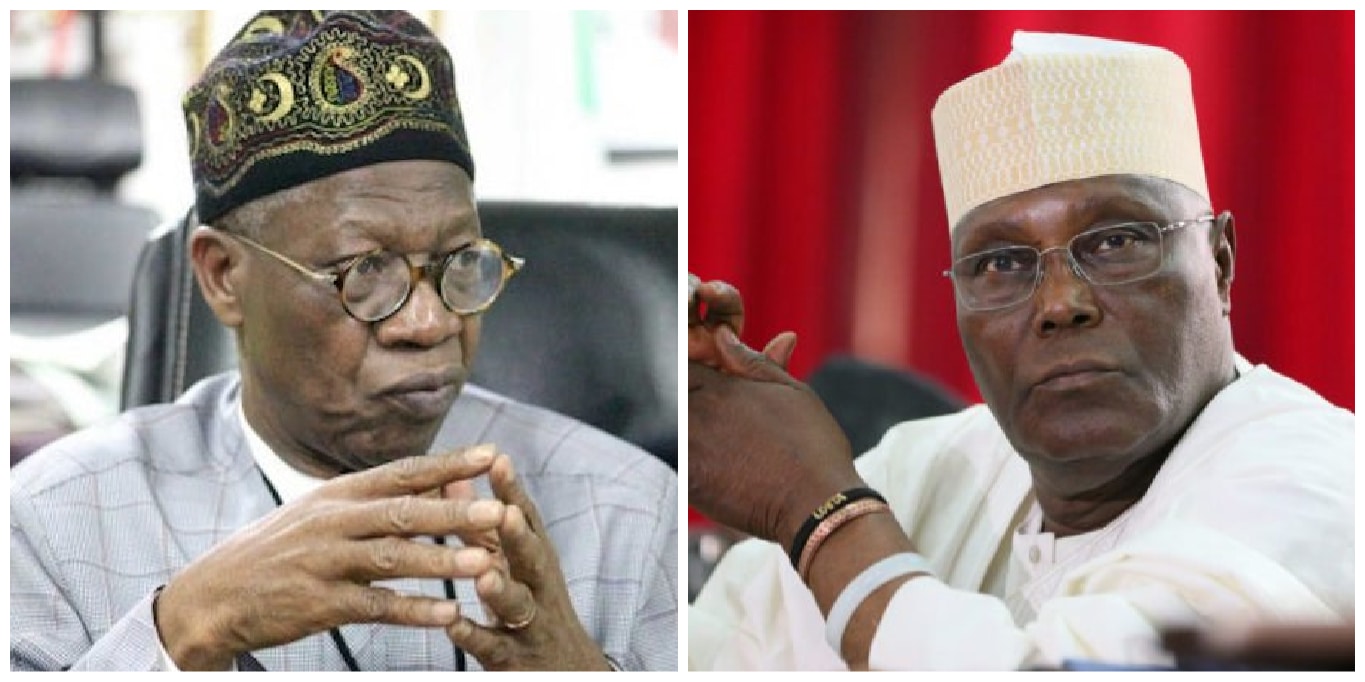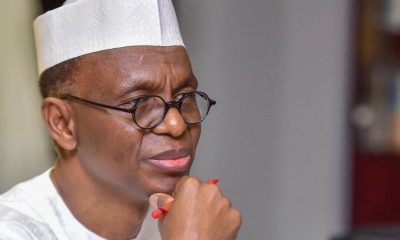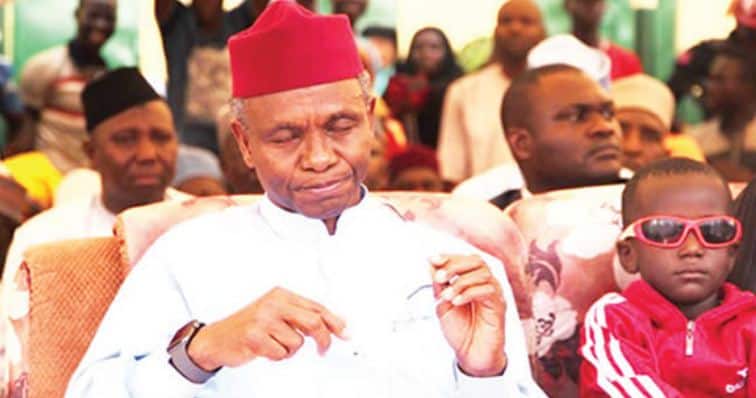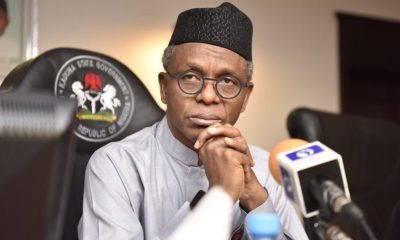Nigeria News
Atiku’s Statement Unfortunate, He Understands Nothing About Buhari’s Gov’t – Mohammed

Nigeria’s Minister of Information and Culture, Lai Mohammed has described as unfortunate claims in the Economic Blueprint released by the presidential candidate of the Peoples Democratic Party (PDP), Atiku Abubakar, in Lagos last week.
Naija News recalls that Atiku at an event in Lagos State a week ago expressed his intention for Nigeria ahead of the 2023 election.
The former Vice President in his drafted blueprint highlighted projects and areas his administration will focus on if elected as the next president of Nigeria in the coming election.
In the economic blueprint, the PDP flag-bearer explained how his government would address job creation, infrastructure financing, relationship with the private sector, rejuvenation of the power sector, poverty reduction, debt management and the overall management of the economy differently from the previous administration.
However, Mohammed who spoke during a press conference at the National Press Centre in Abuja, on Thursday, said Atiku only succeeded in copying the achievement of his principal, President Muhammadu Buhari.
According to him, Atiku was only presenting a poor version of Buhari’s Economic Blueprint.
The Minister said Atiku’s blueprint is a clear explainer that the presidential candidate understands nothing about the incumbent government.
Mohammed said it is necessary for Atiku to understand that Buhari’s administration has been having a handshake with the said private sector he promised to work it.
The Minister said the incumbent government has delivered and is delivering an unprecedented number of projects, including “the 650,000bpd Dangote Refinery, Dangote Fertilizer plant, Lekki Deep Sea Port, BUA Cement, the 5,000bpd Waltersmith Modular Refinery in Imo State; the 2,500bpd Duport Modular Refinery/Energy Park in Edo State; the 2,000bpd Atlantic Modular Refinery in Bayelsa State; the 12,000bpd Azikel Modular Refinery also in Bayelsa; the five LPG Bottling plants and six LPG depots in 10 northern states and Abuja, the 48,000 L/D base oil production plant in Rivers and the 10,000 Metric Tonnes Per Day methanol production plant in Bayelsa, just to mention a few.”
These refineries and other projects according to Mohammed are the result of a “warm handshake between the Nigerian Content Development and Monitoring Board and private sector actors. The private sector is also involved in the ongoing infrastructure development through the Road Infrastructure Tax Credit Scheme, which I mentioned earlier.”
Atiku Know Little About Buhari’s Effort On Making Fertilizers More Cheaper
Mohammed also faulted Atiku’s submission on making fertilizer available for Nigerians at a more affordable price.
He said: “Shockingly, the former Vice President seems to know little or nothing about the Buhari Administration’s unprecedented efforts to make fertilizer available at affordable prices to Nigerian farmers, and how global developments have negatively impacted on the price of fertilizer today, when he said ‘farmers now pay 200% more for a bag of fertilizer – if they see it – than they did in 2020’. This is an unfortunate statement that reflected the total lack of understanding of the issues at stake.
“The Presidential Fertilizer Initiative (PFI), which was flagged off in Dec 2016 by President Muhammed Buhari, aimed to support the domestic blending of NPK 20:10:10 fertilizer in order to reduce the challenges of the Nigerian farmers.
“The PFI delivered on key outcomes, including over 30 million bags of 50kg NPK 20:10:10 equivalent during the project period and price reduction on fertilizer from over N10,000 to under ₦5,500. Over its 5-year run, the programme succeeded in increasing the number of blending plants from only 4 to 72 through the rejuvenation of 68 moribund blending plants, creating hundreds of thousands of indirect jobs and thousands of direct jobs in the process. But a number of factors, which are beyond this Administration, led to the current situation in which the cost of fertilizer rose to between 110 and 150% (That’s between N15,000 for NPK 20:10:10 and N23,000 for NPK 15:15:15).”
The Minister added: “These factors include a three-fold increase in the cost of natural gas, a primary feedstock in fertilizer production, post-COVID-19 shutdowns of key raw materials manufacturing plants, sanctions imposed on Belarus and Russia, occasioned by the war between Russia and Ukraine, and the impact of significant domestic inflation on global and in-country logistics and transportation of fertilizer raw materials. It is also pertinent to recall that President Buhari had negotiated a fixed price for Phosphate at $290/MT and a fixed discount of $15/MT for Potash from the government of Morocco and Russia, respectively. The Presidential Fertilizer Initiative purchased raw materials at these prices for four years, between 2017 and 2020.
“From 2021 however, upon the restructuring of PFI, raw material purchases were undertaken at globally-traded prices. Phosphate prices
increased 32% from $290/MT in 2017 to $1,255.0/MT in 2022, Potash prices rose by 364% moving from $256.0/MT in 2017 to $1,187.5/MT in 2022, while Urea prices rose by 246% from about $300/MT in 2018 to $1,037.5/MT in 2022. Under this development, no magic can keep the price of fertilizer at what it was before the astronomical increase in the cost of production.”
Nigeria Has Been Running On Budget Deficit Since 2009
Mohammed was quick to knock the former vice president for saying that Nigeria under the APC-led government has consistently run on budget deficits since it assume power in 2015.
This again he said Atiku’s claim is nothing but a misrepresentation of the facts. He asserted that Nigeria has been running on budget deficits since 2009 when PDP was still in power.
The Minister recalled that oil prices were over US$100 per barrel in the previous administration.
He noted that under the Goodluck Ebele Jonathan administration in 2014, oil prices fell significantly, resulting in the country’s economic recession in 2016.
The urgency to recover from the recession through an expansionary fiscal policy according to him resulted in the continued budget deficits.
However, in the last three years, the deficit level exceeded the 3% threshold stipulated in the Fiscal Responsibility Act 2007.
He said: “Again, this is understandable because shortly after the Nigerian economy recovered from recession, it was hit by the effects of the Covid-19 pandemic. What His Excellency failed to tell his audience is that the Fiscal Responsibility Act, Section 12(2), allows for the budget deficit to exceed the 3% threshold if, in the opinion of the President, there is a clear and present threat to national security or the sovereignty of the Federal Republic of Nigeria. Gentlemen, you will agree that the Covid-19 pandemic triggered an existential threat in all economies of the world, Nigeria inclusive. Though Nigeria quickly recovered from the economic recession, it is now facing the effects of the Russia-Ukraine war, the lingering impact of COVID-19, and elevated inflation in most economies, prompting monetary tightening, with adverse effects on capital inflow to emerging markets economies.”
Mohammed stressed that while Nigeria may be facing economic challenges under the incumbent government, Atiku’s pronouncement that the future of the country’s economy is ‘bleak’ is sheer scaremongering.
The APC chieftain maintained that the country’s economic outlook is not bleak.
“Instead, the economy has been resilient, having recovered from two recessions within five years – in 2016 and 2020. The Nigerian economy sustained its recovery from the 2020 recession for the 7th consecutive quarter, growing by 3.54% in real terms in Q2 2022, from 3.11% in Q1 2022. Many sectors recorded positive economic growth, reflecting the effective implementation of policy measures prescribed in the Economic Sustainability Plan (ESP), Annual Budgets, Finance Acts and National Development Plan (NDP),” the minister noted.











